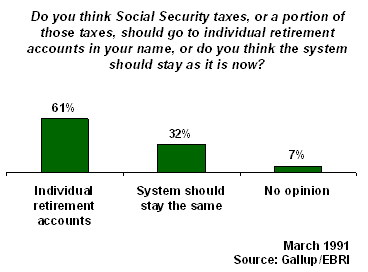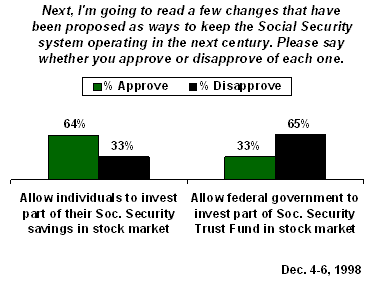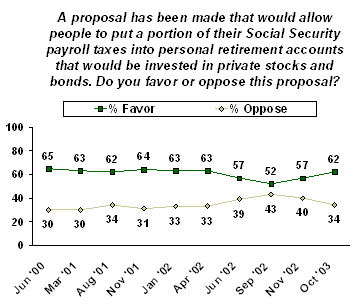GALLUP NEWS SERVICE
PRINCETON, NJ -- To privatize or not to privatize? The answer may depend in part on the looming battle for public opinion on the Social Security issue. For more than a decade, Gallup has been testing the privatization waters with the public, and across that period, the response has been fairly positive. But with unprecedented scrutiny being brought to the concept now that President George W. Bush has elevated it to a national priority, it is unclear whether Americans' historical support for privatization will hold or crumble in the months ahead.
At a fundamental level, Americans still favor the concept of privatization. Findings from a variety of recent questions asked by numerous national public opinion organizations confirm this. When asked about privatization plans in general terms -- with little in the way of specifics, or pros and cons, in the question wording -- the public is slightly in favor of, or at least divided over, allowing a portion of Social Security contributions to be invested in the stock market.
A good example is an ABC News/Washington Post survey conducted in mid-December that asked, "Would you support or oppose a plan in which people who chose to could invest some of their Social Security contributions in the stock market?" Fifty-three percent said they would support the plan, while 44% were opposed.
The Historical Record
In fact, public reaction to Social Security privatization -- without qualifications or elaborate explanations -- has typically been positive for over a decade. These historical trends make it clear that Americans' support for privatization was not spawned by Bush's recent promotion of the idea.
A review of prior Gallup polling shows majority support for the concept as far back as 1991. In that year, Gallup found that, when given the choice, 61% of Americans preferred shifting at least a portion of Social Security taxes into individual retirement accounts, while 32% believed the system should be maintained in its current form.

A few years later, in December 1998, Gallup found a similar percentage -- 64% -- saying they approved of allowing individuals to invest a portion of their Social Security savings in the stock market. (Interestingly, at the same time, only 33% favored allowing the federal government to invest a portion of the Social Security Trust Fund in the stock market.)

Four and a half years ago, in the middle of Bush's first presidential election campaign against former Sen. Al Gore, Gallup consistently found two-thirds of Americans amenable to the basic concept of Social Security privatization. Sixty-six percent in an October 2000 poll said they were "for" a law that "would allow people to put a portion of their Social Security payroll taxes into personal retirement accounts that would be invested in private stocks or bonds." Just 30% were against this. These findings were virtually identical to those from a similar question in a June 2000 poll.
From 2000 (including the previously mentioned June poll) to 2003, Gallup tracked public support for privatizing a portion of Social Security with the following question wording:

Though support fluctuated, the percentage in favor was always greater than 50%, including the most recent reading of 62% in October 2003.
Current Polling
Since the 2004 elections, Gallup and other polling firms have asked about privatization with increasing frequency, using very different approaches to framing the question. The results provide significant insights into public opinion on this important issue.
It appears that Americans are amenable to privatization in principle. The fact that it is being presented as an option -- one that taxpayers can choose or reject for themselves -- is a strong plus with the public. At the same time, charges that the plan puts future retirees' benefits in jeopardy and could cost the Social Security trust fund billions or trillions up front are apparently potent criticisms that could undermine the initial support for privatization that Bush enjoys.
The accompanying table displays 17 different poll questions that have been asked over the last several months about privatizing Social Security, shown in rank order based on the level of support for privatization. The table shows support as high as 60% and as low as 29%:
Poll Questions on Social Security Privatization, November 2004 – January 2005
|
Poll dates |
Poll sponsor |
Attitudes |
Question wording |
|
|
Positive/ |
Negative/ |
|||
|
% |
% |
|||
|
12/14-15/04 |
Fox News/ |
60 |
27 |
Do you think people should have the choice to invest privately up to 5% of their Social Security contributions, or not? |
|
1/12-16/05 |
ABC News/ |
55 |
41 |
Another idea would let workers put some of their Social Security savings into stocks or bonds if they wanted to. That could produce higher or lower benefits depending how the investments perform. Would you support or oppose this stock market option for Social Security? |
|
12/1-16/04 |
Pew |
54 |
30 |
Generally, do you favor or oppose this proposal (which would allow younger workers to invest a portion of their Social Security taxes in private retirement accounts, which might include stocks or mutual funds)? |
|
1/12-16/05 |
ABC News/ |
54 |
41 |
What would you think of a plan that included both these ideas -- a reduction in the rate of growth in Social Security benefits for future retirees, and a stock market option for Social Security contributions? Would you support or oppose that? |
|
12/16-19/04 |
ABC News/ |
53 |
44 |
Would you support or oppose a plan in which people who chose to could invest some of their Social Security contributions in the stock market? |
|
1/25-31/05 |
Quinnipiac |
51 |
43 |
Do you support or oppose allowing individuals to invest a portion of their Social Security taxes in the stock market? |
|
11/18-21/04 |
CBS News/ |
49 |
45 |
Some people have suggested allowing individuals to invest portions of their Social Security taxes on their own, which might allow them to make more money for their retirement, but would involve greater risk. Do you think allowing individuals to invest a portion of their Social Security taxes on their own is a good idea or a bad idea? |
|
12/17-19/04 |
CNN/USA |
48 |
48 |
As you may know, a proposal has been made that would allow workers to invest part of their Social Security taxes in the stock market or in bonds, while the rest of those taxes would remain in the Social Security system. Do you favor or oppose this proposal? |
|
1/13-17/05 |
NBC News/ |
46 |
44 |
Please tell me which of the following approaches to dealing with Social Security you would prefer -- (A) Making some adjustments but leaving the Social Security system basically as is and running the risk that the system will fall short of money as more people retire and become eligible for benefits, OR, (B) changing the Social Security system by allowing people to invest some of their Social Security taxes in private accounts -- like IRA's or 401(k)'s -- and running the risk that some people will lose money in their private accounts due to drops in the stock market? |
|
1/12-13/05 |
Time |
44 |
47 |
President Bush favors changing the Social Security system to allow people to invest part of their Social Security payroll tax in stocks and bonds. Do you favor or oppose this proposed change to Social Security? |
|
1/25-26/05 |
Fox News |
44 |
49 |
Some people think individuals should be allowed to put a small portion of their Social Security contributions into a personal account, which could be invested in mutual funds. While the personal accounts would be subject to the fluctuations of the stock market, individuals would own the funds when they retire. Others think it is better to leave that money in the Social Security system so it could be used to help pay benefits when you retire. Which comes closer to your view? |
-- continued --
Poll Questions on Social Security
Privatization, November 2004 – January
2005
-- continued --
|
Poll dates |
Poll sponsor |
Attitudes |
Question wording |
|
|
Positive/ |
Negative/ |
|||
|
% |
% |
|||
|
1/15-17/05 |
L.A. Times |
42 |
52 |
As you may have heard, there has been some talk about allowing younger workers to divert payroll tax money from Social Security into private investment accounts which they can then manage themselves. Some people say this is a good thing because it is possible to earn a higher rate of return in the stock market. Others say the stock market is too unpredictable to trust it with Social Security funds. What do you think? Do you approve or disapprove of allowing younger workers to divert their payroll tax money from Social Security into private accounts? (If approve/disapprove, ask: Do you approve/disapprove strongly or do you approve/disapprove somewhat?) |
|
12/9-13/04 |
NBC News/ |
41 |
46 |
As I just mentioned, there is a proposal to allow people to invest some of their Social Security taxes in private retirement accounts that invest in stocks and bonds. Supporters of this idea say that these accounts give people more control over their own money and provide the opportunity to receive more money in retirement. And, because these funds are yours, they can be passed onto your family as part of your estate. Opponents of this idea say that it is expensive because it could cost between one and two trillion dollars over the next 10 years to add these accounts to the system, and it would be dangerous because a major downturn in the stock market could make it impossible to pay Social Security benefits to millions of people. Who do you agree with more on this issue -- those who support this idea or those who oppose it? |
|
1/7-9/05 |
CNN/USA |
40 |
55 |
As you may know, one idea to address concerns with the Social Security system would allow people who retire in future decades to invest some of their Social Security taxes in the stock market and bonds, but would reduce the guaranteed benefits they get when they retire. Do you think this is a good idea or a bad idea? |
|
1/13-17/05 |
NBC News/ |
40 |
50 |
In general, do you think that it is a good idea or a bad idea to change the Social Security system to allow workers to invest their Social Security contributions in the stock market? |
|
1/13-17/05 |
NBC News/ |
33 |
56 |
Would you favor or oppose a plan to change the Social Security system that includes gradually reducing the amount of money that people receive as their guaranteed Social Security benefit in exchange for allowing workers to invest some of their Social Security taxes in the stock market? |
|
1/5-9/05 |
Pew |
29 |
65 |
People have different opinions about how the Social Security system might be changed for the future. When decisions about Social Security's future are being made, which do you think is MORE important: keeping Social Security as a program with a GUARANTEED monthly benefit based on a person's earnings during their working life, OR, letting younger workers DECIDE for THEMSELVES how some of their own contributions to Social Security are invested, which would cause their future benefits to be higher or lower depending on how well their investments perform? |
What can we learn from an examination of these data?
One obvious conclusion is that Americans' support for Bush's Social Security "reform" plan as measured in these surveys depends on how the question is worded. In turn, this indicates that many Americans do not have firm opinions of the plan in their own minds. Both proponents and opponents of privatizing Social Security can presumably seek solace in these findings. Proponents can note that a number of basic questions about privatizing find majority or plurality support for the concept. Opponents can note how support drops significantly in many instances when consequences or implications of privatizing Social Security are explained to respondents.
In the broadest terms, it appears there are three ways of asking about Social Security privatization, which result in three levels of support:
1. Questions that ask simply about creating a private investment component to the Social Security system at the option of the worker tend to receive plurality to majority support.
2. Questions that provide relatively balanced pros and cons of the privatization proposal -- mentioning both the benefit of saving the system from bankruptcy as well as the financial risks to individual investors -- tend to find a plurality or slim majority opposed to the plan.
3. Questions that focus on the financial risks to individual investors -- those stating that the plan would reduce guaranteed benefits to retirees without mentioning that this would be compensated for by private investment-account earnings -- find larger majorities opposed.
In general, lower support levels are found when questions include phrases such as these:
- "gradually reducing the amount of money that people receive as
their guaranteed Social Security benefit"
- "reduce the guaranteed benefits they get when they retire"
- "it is expensive because it could cost between one and two
trillion dollars over the next 10 years to add these accounts to
the system, and it would be dangerous because a major downturn in
the stock market could make it impossible to pay Social Security
benefits to millions of people"
- "the stock market is too unpredictable to trust it with Social Security funds"
The questions included in the table above were asked by a variety of polling organizations at different times over the past three months. They were not designed to systematically measure the precise impact of various components or consequences of proposals for privatizing Social Security. The disparate circumstances in which the questions were asked (including in particular the placement of the questions in the various survey contexts and differences in timing of the surveys) could have made a difference in the responses obtained. Some surveys containing these questions had elaborate sequences of questions about Social Security that preceded the questions presented here. Others did not. All of this could have caused variation in the question results.
Thus, at this time, we cannot calibrate with precision exactly how the public will react to the inevitable twists and turns in the debate over Social Security privatization in the months ahead. The fact that the debate is being played out in an extremely partisan context also means that public reaction will be mingled with pre-existing attitudes toward President Bush.
But several conclusions based on available data do appear reasonable:
1. Basic support for the idea of privatizing Social Security has been at the majority level for well over a decade.
2. In the much more politicized environment of the last several months, survey questions asking about Social Security privatization show widely varying support levels.
3. Survey questions that simply ask about the concept of privatizing Social Security (with no qualifications or downsides) tend to get plurality if not majority support, suggesting that the basic concept still seems like a positive one to many Americans.
4. Questions that remind respondents of problems with privatizing Social Security tend to get significantly lower levels of support, suggesting that opinion is far from well-formed or entrenched at this point.
5. Thus, it appears that the campaign to win the hearts and minds of Americans on this issue is still very much wide open.
- The Bush administration has an advantage in that public opinion
about the concept of privatizing Social Security has generally been
positive over the years.
- The Democrats have an advantage in that majority support for
the idea appears to evaporate quite quickly when the public is
reminded of downsides associated with changing the Social Security
system in its current form.
6. Finally, it is important to note that the privatization issue is rapidly becoming more partisan. The concept is now being actively promoted by a Republican president, and widely criticized by his Democratic congressional opposition. This suggests that public opinion on Social Security could devolve into nothing more than a referendum on the president.
